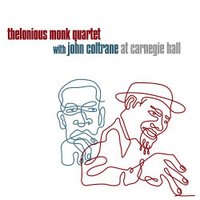Thelonious Monk Quartet with John Coltrane at Carnegie Hall

Being a devotee of classic jazz, it's not often that I find myself on the edge of my seat with anticipation of a new release. Such momentous events as the the coming to light of a rarity like this Monk & Trane set doesn't happen every day - come to think of it, I still remember getting fired up when the Five Spot recordings surfaced. Though the music on from the Five Spot recordings was electrifying, the fidelity of the recordings themselves left a bit to be desired. No so with The Thelonious Monk Quartet at Carnegie Hall CD - this is the next best thing to studio quality (bass is a little weak, and drums a bit loud and boomy at times - these being rather realistic characteristics of the Hall though).
"Early Show"
Whatever the case, the music recorded that night in '57 is as magical today as it was then. Monk's Mood here is played here with an incredible poignancy: Thelonious' solo intro chorus shows the pianist at the height of his powers, manipulating time and harmony brilliantly. Trane comes in with his statement of the melody after a breathtaking duet of cascading, fluid, intertwining lines exchanged with Monk - then the two proceed through staggeringly beautiful interpretation of the melody. Time is elastic, yet the pulse remains firmly implied as Monk & Trane (and Abdul-Malik) continue to reiterate the melody, embellishing it with ever-more dazzling interplays of runs with each successive chorus. Always one of my favorite Monk tunes, this version stands out amongst recordings I've heard - Monk & Trane are truly playing as one here, completely inside the tune, inside the moment, inside each other's ideas. This piece alone is worth the price of admission: One of the most beautiful pieces of music one could ever hope to hear.
This of course, is just the beginning. After the transcendent, cathartic, timeless moments of Monk's Mood, the quartet launches into Evidence. After a few choruses, Trane is up to speed, "sheets of sound" unfurling effortlessly, pushing the progression ahead with a gloriously relentless inevitability. A deceptively simple (or seemingly standard) A section of the progression is transformed by Coltrane into stunning, brilliant architecture of arpeggios and dizzying runs. Monk delivers a what can only be described as a perfectly Monkish solo: an idiom unto himself, he fully exploits his singular vocabulary here. Trane's subtle (almost tentative?) return with the melody finds Monk setting up a great, funky offbeat accompaniment - comping in between the accents of the melody, maximizing the angularity and propulsive nature of the line.
We're treated to some more unaccompanied Monk for the first chorus of Crepuscle With Nellie (wouldn't want it any other way). Coltrane enters with the rhythm section, languidly stating the melody in unison with Monk, Thelonious interjecting the occasional, ideally timed cluster comps that leap up from the mix, jagged accents in the otherwise still soundscape of the piece.
Nutty abruptly changes the mood - Shadow Wilson making his presence known with some well-placed accents (a la Klook's famous "bombs") - and Trane barging in for a few searing choruses leading up to Monk's spartan solo, lines of fragile, delicate beauty that never stray far from the melody. The theme reemerges effortlessly and the quartet wraps up this succinct (and comparatively "sane") version of Nutty before the closing number of the "Early Show."
Wilson & Abdul-Malik set up a sizzling polyrhythmic groove against the melody of Epistrophy, as Monk & Trane state the melody together. This tune seems tailor-made for Trane - the progression ideally suited for his harmonic explorations and spiraling patterns. Thelonious again juxtaposes the roiling density of Trane's closing solo statements with a sparse entrance. Monk takes a brief solo punctuated with a few deftly placed careening runs, before the group cooks their way through the closing melody.
"Late Show"
...coming soon...
The Thelonious Monk Quartet at Carnegie Hall (Blue Note 0946)
Carnegie Hall, NYC
November 29, 1957



0 comments:
Post a Comment